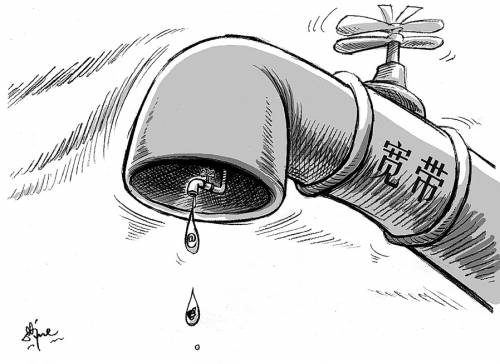
A large number of web users in China are not enjoying the speeds promised by fixed-line broadband carriers. (Cartoon: Xu Jian / China Youth Daily)
(Ecns.cn) -- Most Internet users in China are not enjoying the speeds promised by fixed-line broadband carriers, and there are few signs that the country's telecom regulator is working to fix the problem, observes The Beijing News.
Miss Su, a white-collar worker in Beijing, says she spent 2,100 yuan (US$332) for a one-year contract of 6 megabyte bandwidth service (768kb/s) earlier this year. The service, which she now calls "fake broadband," won't allow her to watch movies online without frequent difficulties.
Su's suspicion that she had been cheated was confirmed when she hired a technician from the Internet Center of Tsinghua University to investigate her broadband speed, which turned out to be far slower than what she had paid for.
When Su complained to the broadband carrier, a secondary service provider called Yinglian, she was told that the promised bandwidth of 6 megabytes was an exclusive service. The company refused to offer any further explanation.
A large number of web users in China have been frustrated by the same problem, with many pointing fingers at misleading advertisements.
Between January and September, Shanghai's consumer protection commission received 3,618 complaints about broadband access, most of which were focused on slow speed, frequent disconnections and the gap between actual speeds and those claimed by service providers, according to Shanghai Daily.
During the eight-day Super Golden Week holiday, the city's consumer rights hotline received 72 complaints about Internet service, up 60 percent from the same period last year, the newspaper reports.
According to the latest information from the Data Centre of China Internet (DCCI), most of the country's users have subscriptions to 2 and 4 megabyte bandwidth services (256kb/s and 512kb/s), but they tolerate average speeds of only 142.2kb/s and 232.7kb/s.
By the end of 2011, China had about 505 million Internet users, including about 150 million broadband customers. Not surprisingly, complaints about poor service have become increasingly prominent, and the number of legal disputes has also grown.
Last month, the Ministry of Industry and Information Technology (MIIT) stated on its website that the country aims to have more than 250 million broadband users by the end of 2015, with Internet access speeds reaching 20 megabytes in urban locales and 4 megabytes in rural ones.
In some regions, where web users may be spending a lot of time loading graphics with low-performing Internet services, the country is even aiming for 100 megabyte broadband, the statement says.
Yet many worry that the changes the ministry is touting will only result in lamentable speed at a much higher cost: if a broadband subscriber has a 2 megabyte connection and pays for a 6 megabyte service pack, he can hardly expect the performance of 100 megabyte broadband, for example.
According to a report by China Central Television, most sufferers of "fake broadband" and sluggish Internet are subscribers to secondary service providers that trick customers into sharing bandwidth. If those companies actually provided the bandwidth they promised, they would lose money.
Experts suggest that the interests of broadband subscribers should be protected by law, as the current legal system does not provide sufficient clauses for such cases, writes China Youth Daily.
Meanwhile, the government must formulate more regulations to ensure fair competition and come up with development strategies for the industry. Countries such as the United States, Australia and South Korea have already set up effective systems to ensure quality broadband services, the newspaper adds.
In the U.S., actual broadband speed was at least 80 percent of what customers were promised in 2011, according to the Federal Communications Commission (FCC).

Copyright ©1999-2011 Chinanews.com. All rights reserved.
Reproduction in whole or in part without permission is prohibited.